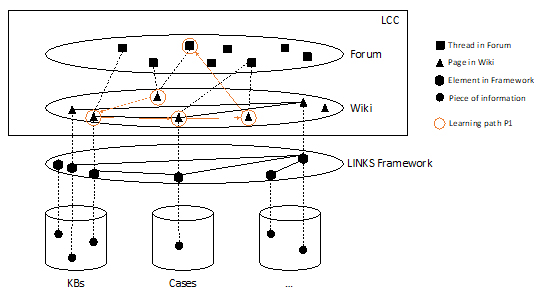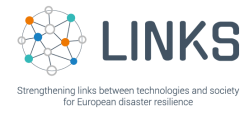
Maximilian Kiehl, Robin Marterer and Therese Habig, Safety Innovation Center
A key objective of the LINKS project is to build a sustainable, multidisciplinary, stakeholder community consisting of different actors from different countries, professions and schools of thought but all interested in the field of social media and crowdsourcing (SMCS) in disasters. An important tool for this community is the LINKS Community Center (LCC) as it will be the technical foundation for the online community.
The LCC brings together the different stakeholders of the LINKS Community in one user-friendly and flexible web-based platform and enables them to exchange knowledge and experiences and to access, discuss and assess knowledge on the usage of SMCS in disasters. The knowledge is included in the LINKS Framework and presented in the LCC as standalone knowledge and learning materials (e.g. methods, ready-implementable tools and easily applicable guidelines to achieve a more effective use of SMCS in disasters) and learning paths. The evaluation and practical application of the LINKS Framework will be enabled by supporting the LINKS case-based assessments of the Framework. The LCC therefore plays an important role in creating and fostering a lively community around the LINKS project and the project’s results. Furthermore, the LCC strives to be a valuable tool for establishing and sustaining the LINKS Community beyond the duration of the LINKS project.
The first step towards realizing the LCC was made in Deliverable 7.1: it created the foundation for the LCC by describing a first version of the needs (stated demand for a (non-)technical solution) and potentials (existing (non-)technical solutions that could match a need) regarding defined stakeholder groups (e.g. practitioners, researchers or policy makers) of the LCC. This was achieved by analysing related work (both on online community building and on related existing online networks and platforms) and by conducing workshops and a survey with the future users of the LCC. These needs and potentials are currently being analysed in the context of Deliverable 7.2 with the goal of designing a concept for the LCC.
This concept will include an architecture based on open-source technologies for addressing the needs and potentials identified in Deliverable 7.1 as well as ideas for creating an active and sustainable community-based platform. Current drafts of this architecture use a wiki for accessing the advanced learning materials provided by the LINKS Framework, a forum as a discussion and communication layer on top of the wiki and a collaborative cloud software to share large files, such as videos and to collaboratively work on documents. These three main components will be connected conceptually and technically to each other with the goal of making the LCC feel like one coherent platform. This will include a common look and feel and a common login system for the three components.
The overall approach to the LCC and its relation to the other LINKS components is shown in the accompanying figure.

From bottom to top, information is initially generated in the knowledge bases or in the case-based assessments. Linking, aggregation and enhancement of this information is performed within the LINKS Framework. The Framework forms the basis for the wiki within the LCC, which makes the knowledge contained within the Framework and the Knowledge Bases accessible to all users. Furthermore, users can use the forum in the LCC to discuss (amongst other things) pages of the wiki, which in turn reflect elements of the Framework and subsequently e.g. the knowledge bases. Note that all connections are bi-directional, i.e. that knowledge can be transferred from bottom to top but also from top to bottom. Learning paths (in this example the path P 1) guide the users through the LCC by providing specific entry points, flows between pages and dedicated areas in the forum which could be used to ask for help regarding the learning path or to provide feedback. For example, a firefighter wanting to learn about risk communication on social media might be guided through the knowledge generated from the knowledge bases (i.e. how to best communicate risk to specific groups and which tools to use) and practical examples acquired during the LINKS case-based assessments.
A first demonstrator of the LCC is planned to be tested from September 2021. Interested in engaging with the development and use of the LCC? Read more in this newsletter about how you can join the LINKS Community!

